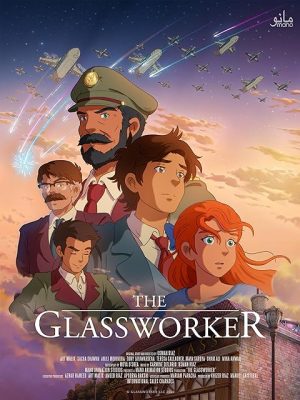It is often said that art is the bridge that connects us all, no matter where we come from. Resonating with this principle, Pakistan’s first hand-drawn Ghibli-style animated film, “The Glassworker,” has opened a new territory for Japanese anime production worldwide.
The film is by debut director Usman Riaz, who termed it his “labor of love” in the heartfelt monologue in the precredit of the film. Accomplishing this feat was nothing short of a miracle in an industry at a nascent stage. Riaz spent 10 years completing his passion project, gathering his team, and building a studio from scratch to roll out his first-of-its-kind project in Pakistan.
The result was impressive. The movie from Mano Animation Studios exceeded expectations and received massive critical acclaim in several prestigious film festivals. It became the first South Asian film to compete in the Annecy International Animation Film Festival 2024 and was presented at the Cannes Film Festival. The meticulously crafted 144,000 frames of “The Glassworker” received unanimous praise for its compelling story, cinematography, detailed art direction, melancholic music, and the integration of Pakistani culture in the screenplay. The movie impressively integrated renowned director Hayao Miyazaki’s Ghibli-style animation, the director’s inspiration, with Stanley Kubrick’s anti-war themes.
The film’s story might call to mind the comparatively pro-war American classic “Casablanca,” which is renowned for having a soul-stirring romance set against the backdrop of World War II. However, despite being a love story between two youngsters, “The Glassworker” aims to critique war as it takes everything away from the main leads despite their boundless love. War is depicted as a monster that crushes those who oppose and fight against it.
The setting of the movie – a fictional disputed land reminiscent of Kashmir – also conveys a message on the unwantedness of war. Residents often aggressively complain about the military’s presence in their land, despite the movie also acknowledging the few merits of the soldiers, such as martyrdom and the military’s commitment to save the young officers.
Making a movie with an anti-war theme in a state known for glorifying war in its history is a bold step. Despite taking 10 years to hit the screens, the movie is relevant for the contemporary Pakistani witnessing immense political crises of late. The film was lucky to avoid banning and censorship in Pakistan. The Pakistani censor board is known for making harsh decisions to curtail the freedom of expression.
Riaz acknowledged that he tackled issues and themes in the film set in a fictional land that would have been difficult if the setting was based in Pakistan. However, he did not anticipate that by the time his film was completed, there would be active wars occurring in various parts of the world.
Despite the filmmaker’s success in delivering a solid debut for hand-drawn animation in Pakistan, the film has failed to rake in numbers that previous successful animated films, such as “The Donkey King” and the “3 Bahadur” series, have generated at the box office. Previous financially successful animated movies in Pakistan often were children-friendly. In contrast, the sad tone of “The Glassworker” may have served to dampen the movie’s box-office pull.
The film may not have found enormous love from ticket-paying audiences in Pakistan, but its prospects look encouraging abroad as the film is expected to hit screens in Japan through the distributors Elles Films. If all goes well for “The Glassworker” team, this may open doors for exciting opportunities for the animation industry in Pakistan and fulfill the director’s plans to put Pakistan on the map of booming animation industries globally.
Fortunately, Japan has already shown some love for “The Glassworker” through its premiere at the Hiroshima Animation Season 2024. That, combined with anime fandom positively reviewing the film on social media platforms such as X, will encourage and boost the confidence of aspiring anime filmmakers in Pakistan.
The movie’s success in the Hiroshima-based festival depicts a fascinating tale of the aligning of stars: an anti-war film getting praise in a city notorious for witnessing the most devastating and lethal destruction of war in human history.
As French impressionist Edgar Degas put it, “Art is not what you see, but what you make others see.” This film may have refreshed the harrowing recollection of the Hiroshima atomic bombing for the Hiroshima Animation Season audience, as anime films such as “Grave of the Fireflies” and “In This Corner of the World” had previously done.

































